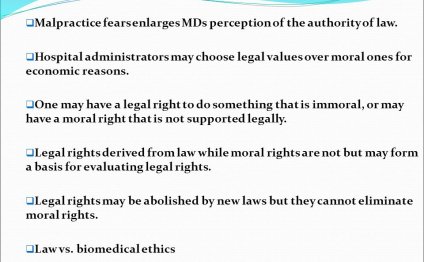
Medical futility case
The term “medical futility” is widely used in end-of-life treatment, however it are time for an inform in language. In some instances, “medical futility” has actually exacerbated dispute between medical professionals and clients’ people, resulted in ugly litigation, and undermined trust in the health profession. Better language is present, so it's time for phrase “medical futility” becoming restricted to the couple of situations that it undoubtedly is applicable.
Each day in hospitals across the nation, physicians cite “medical futility” as a reason to withdraw or withhold life-sustaining therapy whenever patients—or, more regularly, their particular families—insist on continuing it. A process is precisely called “futile” when the patient’s medical problem renders it inadequate, so that it cannot attain the benefit it absolutely was designed to result in. The expression is typically placed on technical air flow, assisted nourishment and hydration, and cardio-pulmonary resuscitation, however it is placed on other remedies aswell. The fatal mistake arises when medical experts invoke “futility” to discontinue an operation that'll retain some benefit the client, but which however may not be really worth continuing.
Discover widespread confusion about "medical futility" that leads to difficult misuses regarding the term. Fortunately, invoking futility will not always intensify dispute considering that the goodwill of medical professionals and families usually makes it possible for all of them to work together to eliminate their distinctions. The confusion about futility doesn't assist, however, and can trigger unnecessary conflict, spend your time and resources, and strain emotional power.
The Situation with “Medical Futility”
Even though term “futility” connotes uselessness and meaninglessness, it is sometimes placed on treatments being however notably effective. In these cases, clients’ people are kept wondering why the process is called useless if you have still some small benefit. Such processes may still have value for those kinds of circumstances, together with patients’ and households’ grounds for following the treatment should go into the conversation.
Invoking “futility, ” however, cuts that discussion short. Medical experts are often not being deceptive; quite often, they're saying that a procedure cannot seem worth it as it wont notably enhance the patient’s problem. The thing is this term cannot adequately convey their definition about a potentially volatile problem.
The case of Baby Joseph Maraachli provides a clear, real-life example. The question had been whether to execute a tracheotomy, which would have permitted your family to care for Baby Joseph yourself until their demise. Regardless of whether your family or perhaps the physicians had better wisdom, a tracheotomy had not been futile in Baby Joseph's situation, even though the physicians advertised that it was.
Baby Joseph was born with an unusual, degenerative neurologic disorder sooner or later diagnosed as Leigh’s Disease. The moms and dads requested a tracheotomy, plus the doctors refused, saying that a tracheotomy is an invasive process suggested for patients whom require a long-term respiration device rather than for customers merely getting palliative care. They called a tracheotomy “futile” in Joseph’s situation given that it would cause much disquiet, boost the threat of disease and pneumonia, and impose arduous burdens of care on the household. Nevertheless health practitioners never ever said—and cannot say—that a tracheotomy wouldn't alleviate Baby Joseph’s breathing and realize the household’s aim of caring for him yourself.
The moms and dads effortlessly saw the inconsistency between your doctors’ language and also the truth of their child’s problem, because they had had a daughter with the same condition just a few many years before. In her own situation, they had requested a tracheotomy, that was performed, together with looked after her yourself until she passed away. They comprehended and had been willing to accept the burdens of attention.
The debate created a flooding of heated rhetoric within the media. Your family and their supporters said that the physicians had been attempting to kill Baby Joseph, even though the analysis board claimed your parents were blinded by their love with regards to their child and unable to see the situation objectively or from their child’s perspective. In this case, invoking “futility” turned a tragic circumstance into an intractable conflict.
Medical Judgments and Value Judgments
The theory behind “medical futility” usually health education and clinical experience enable doctors to evaluate a patient’s medical problem and identify treatments rendered useless by that problem. A current reputation for the futility movement recalls the foundation with this principle:
The action [in the 1980s] to establish a policy on futile treatment had been an attempt to persuade community that doctors could use their particular clinical judgment or epidemiologic skills to find out whether a specific treatment will be useless in a specific medical situation. The concept ended up being that once these types of a determination had been made, the medic ought to be allowed to withhold or withdraw the treatment, also within the objections of a reliable patient.
Whenever doctors notice that cure is inadequate, they usually have a task to express it cannot gain the in-patient. Most customers and their particular surrogate decision-makers are not trained in medicine and, rather accordingly, cannot contribute to this kind of view.
The honest conversation changes if there truly remains some health advantage to carrying out the therapy. If so, the therapy can help the in-patient to quickly attain targets of treatment, even if it does not heal the root problem. The choice to make use of the treatment solutions are based not only on what really it works additionally on what its advantage means to your patient and family. The in-patient and family come in the most effective position to guage exactly what the many benefits of treatment—even marginally beneficial treatments—would suggest to them.
People in the health team might clarify whatever they would do beneath the conditions, without always imposing their particular values on customers. They could offer thoughtful views according to their particular values, not just on clinical judgments. Providing these values-based views may be of good advantage to clients, surrogates, and families—but providing these types of perspectives just as if these were based on clinical wisdom alone does not precisely represent the sort of wisdom offered.
Share this Post
Related posts
How to maintain health during times of stress?
A modern person experiences the same stress on weekdays as on a dark street. As a result, the nervous system is depleted…
Read MoreHow to Choose Healthcare Products
How to Choose Healthcare Products When it comes to health issues, quality of products we use is very important. There are…
Read More
















